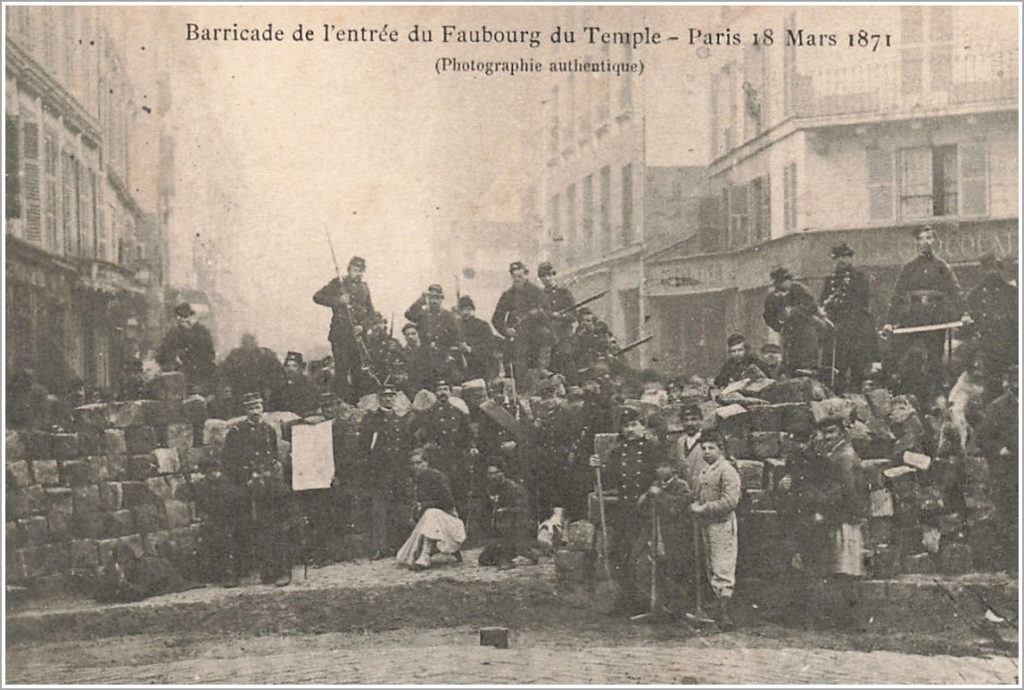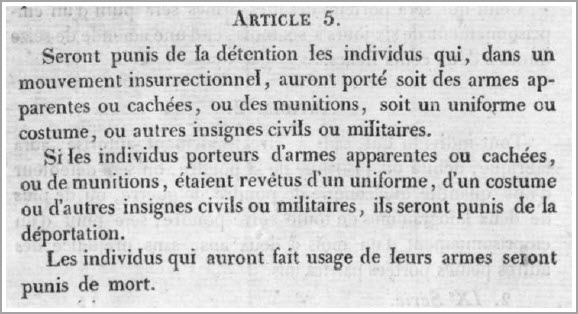The War of 1870, the first of a series, pitted the French against the Prussians.
It all began with the victory of the Prussian armies, commanded by Bismarck, leading to the capitulation of Emperor Napoleon III at Sedan. The victors occupied the capital and the population refused to recognise the government that emerged from the Constituent Assembly, elected by the male electorate of the unoccupied territories. The cities of Lyon and Marseille rose up, others followed, and, finally, the capital rose up for 72 days, from March 18 to May 28, 1871.

So those in favour of the Government and those against the occupation are opposed… Calm was restored, the Emperor was exiled in London, and the military justice system took power and tried the insurrectionists who had remained in France. Charles Henri DEVILLERS was one of the defendants who appeared before the Council of War…
Charles Henri DEVILLERS was born on 9 October 1820 in Saint-Quentin, in the Aisne department. He is married to Pauline PINGUET and has a daughter, Pauline Eugénie. The latter married on September 23, 1865, in Paris, to Léon Dominique VINOT, and mother of a little Louise Joséphine Aurélie, aged 4 at the time of the Commune.
Father and grandfather, Charles Henri never stops fighting for his ideas! Incarcerated in the Prison des Chantiers, he appeared before the 20th Permanent Council of War sitting in Versailles on 11 May 1871.

He declares that his name is Henri and lives at 11 rue Germain Pillon in the 18th arrondissement. He came with his wife in 1852 with the intention of working as a carpenter. He had different employers but stayed with Mr. MALÉRION, 2 rue Chaptal, for 8 years. During the siege of the Prussians, he worked for Mr. LAMI, carpenter, 204 faubourg Saint-Denis.
During the siege of the Prussians, he enlisted in the 2nd Company of the 158th Battalion, which he did not leave throughout the insurrection. He was then assigned to the 1st Company as a sergeant and mounted guards in his quarters. On April 2, 1871, he and his companions were sent to the Champ de Mars but did not know the reason. Almost all the Battalions were present. The next morning, many leave and there is no distribution of bread. Charles Henri went to the Esplanade des Invalides to find them and, on his return, his Battalion was no longer there. While he was looking for him, he was hit in the foot by a bullet from who knows where. It was only when he fainted and was taken to the ambulance of the Legislative Corps that he realized the extent of his wound. He was operated on the next day.
As soon as the French military troops entered, he was arrested. An exchange of letters between Colonel GAILLARD and Mr. Victor LEFRANC, Minister of Commerce, says that, in fact, he was indeed wounded on April 3rd, but at Bas Meudon and not at the Esplanade des Invalides.
The Council of War did not retain, as a previous conviction on his criminal record, a bankruptcy as a haberdasher, rue de l’Empereur in Montmartre, while his daughter, Pauline Eugénie, was the manager.
« This man had the rank of sergeant and despite his age did active service in his battalion. The origin of the wound he received is in no way proven in the sense in which he indicates it. It is more than probable that he received this wound while fighting, that he was carried to the ambulance of the legislative body, and that after the retreat of the insurgents from that point, he devised the explanation he gives to diminish the gravity of his position.«
It was finally decided that his presence, at the age of 50, in a marching company clearly denotes that he was a supporter of the commune, as well as, for that matter, all the inhabitants of Montmartre, his district.
On 25 May 1872, the 20th Permanent Council of War acquitted him, deeming him not guilty of the charge of participation in the Paris insurrection. He was therefore released. He could have been punished by article 5 of the law of 24 May 1834 – the law on the possession of arms or ammunition – with detention, deportation or even the death penalty.

« Persons who, in an insurrectionary movement, have carried either visible or concealed weapons, or ammunition, or a uniform or costume, or other civil or military insignia, shall be punished with detention.
If individuals carrying visible or concealed weapons, or ammunition, were clothed in a uniform, a costume or other civil or military insignia, they shall be punished by deportation.
Individuals who have used their weapons will be punished by death. »
Charles Henry DEVILLERS died in Montmartre on March 12, 1883, at the age of 62!
Source :
– Armed Forces Historical Service – Vincennes – GR 8 J 435 [8J435]
-Gallica/BnF – Bulletin of Laws – 1st semester 1834 – N° 124 – Laws on Holders of Arms or Munitions of War
An article on Charles Henri DEVILLERS was previously published on the Canalblog website on February 16, 2017 https://antequam.canalblog.com/archives/2017/02/16/34935914.html
La version française ? C’est là…
























